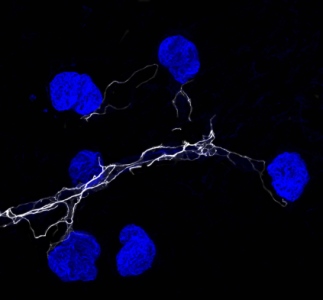 Image credit: Dr. Baptiste Lacoste and Naomi Boisvert
Image credit: Dr. Baptiste Lacoste and Naomi Boisvert
Chris Kennedy’s team has found that the nervous system controls how quickly the kidneys filter blood, and one protein is essential to this process. In the first study of its kind, the team found that a lack of the protein ubiquitin C-terminal hydrolase L1 (UCHL1) can significantly change the structure of nerve cells in the kidney, having a dramatic effect on kidney function. The kidneys filter out salts and toxins through tiny balls of blood vessels called glomeruli, and nerve cells control how much blood reaches these structures. If the filtration rate is too fast or too slow, it can damage the kidney. In mouse models without UCHL1, these nerve cells had trouble finding the right place to attach and let too much blood flood into the glomeruli. This new knowledge of how the filtration rate is controlled could one day be used in the treatment of kidney disease. Image credit: Dr. Baptiste Lacoste and Naomi Boisvert
“It was like a detective story," said Dr. Kennedy. "We had to go through all the possible reasons why the kidneys were filtering too fast to rule out the wrong answers and find the right one.”
Reference: Clinical Science
Authors: Naomi C. Boisvert, Chet E. Holterman, Jean-François Thibodeau, Rania Nasrallah, Eldjonai Kamto, Cesar H. Comin, Luciano da F. Costa, Anthony Carter, Richard L. Hébert, Alexey Gutsol, Gregory O. Cron, Baptiste Lacoste, Douglas A. Gray, Chris R. Kennedy
Funders: All research at The Ottawa Hospital is supported by generous donations to the hospital. This study was also supported by the Kidney Foundation of Canada.
Core Facilities used: Small Animal MRI
The Ottawa Hospital: Inspired by research. Driven by compassion
The Ottawa Hospital is one of Canada’s largest learning and research hospitals with over 1,100 beds, approximately 12,000 staff and an annual budget of over $1.2 billion. Our focus on research and learning helps us develop new and innovative ways to treat patients and improve care. As a multi-campus hospital, affiliated with the University of Ottawa, we deliver specialized care to the Eastern Ontario region, but our techniques and research discoveries are adopted around the world. We engage the community at all levels to support our vision for better patient care. See www.ohri.ca for more information about research at The Ottawa Hospital.
University of Ottawa: —A crossroads of cultures and ideas
The University of Ottawa is home to over 50,000 students, faculty and staff, who live, work and study in both French and English. Our campus is a crossroads of cultures and ideas, where bold minds come together to inspire game-changing ideas. We are one of Canada’s top 10 research universities—our professors and researchers explore new approaches to today’s challenges. One of a handful of Canadian universities ranked among the top 200 in the world, we attract exceptional thinkers and welcome diverse perspectives from across the globe. www.uottawa.ca
Media Contact
Amelia Buchanan
Senior Communication Specialist
Ottawa Hospital Research Institute
Office: 613-798-5555 x 73687
Cell: 613-297-8315
ambuchanan@ohri.ca
